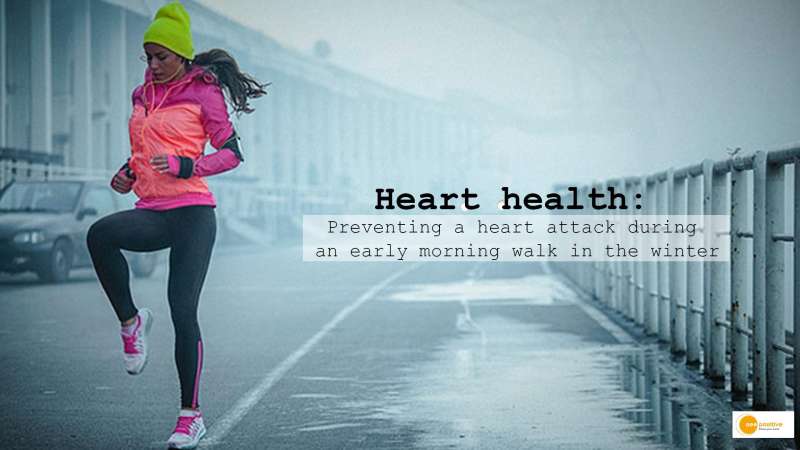

The early morning chill can be hazardous to your heart health, especially if you exercise without warming up or wear inappropriate clothing. Cardiologists offer advice on how to avoid early morning heart attacks.
According to researchers, most heart attacks occur between 4 and 10 a.m. because of an increase in the secretion of certain hormones such as epinephrine, norepinephrine, and cortisol, which may cause an increase in oxygen demand and blood pressure.
Reduced levels of endothelial progenitor cells can also increase the likelihood of a heart attack. Winter mornings can exacerbate the risk of a heart attack because the chill can affect the cardiac health of high-risk people, such as those with hypertension, diabetes, or lung problems. According to experts, these people should avoid early morning workouts or walks, and if they do go for walks in the morning, they should cover their ears, chest, legs, and head well.
“We are all aware that heart attacks occur during the early hours of waking and during the winter season due to cold weather. It also increases the risk of a heart attack. People who are high risk, which means they have a family history of heart disease, have high blood pressure, are diabetic, or have another lung problem, should not go for early morning winter walks (or workouts) “Dr. Udgeath Dhir, Director and Head of Cardiothoracic and Vascular Surgery (CTVS), Fortis Memorial Research Institute, tells HT Digital over the phone.
WHY CAN AN EARLY MORNING WALK IN WINTER INCREASE THE RISK OF A HEART ATTACK?
“During the winter, the body is already trying to increase metabolism in order to conserve body heat; the body is already in a hyperactive state. If we must go for early morning walks, we must protect ourselves from the cold. We must cover our extremities, which include our head, ears, hands, and toes. Warm up your chest area first, and never begin exercise without first warming up. Warming up is critical, especially during the winter season. If we do not exercise properly and those who are at high risk have heart attacks and strokes in the winter, “Dr. Dhir says.
“Winter mornings raise the risk of cardiovascular disease. Winter has an inverse relationship with blood pressure. Cold weather raises the pressure, causing our hearts to beat faster and require more blood to pump, which is not good for someone with a weak heart. “Because we can’t change the weather, taking precautions is the best way to deal with the problem,” says Dr. Manjinder Sandhu, Vice Chairman, Cardiology, Paras Hospitals, Gurugram.
POLLUTION AND FROST CAN BE A DEADLY COMBINATION
“When there is pollution combined with winter, there is smog. These are harmful to the lungs and heart. The air we breathe puts extra strain on our lungs, and because our lungs are connected to our hearts, it also puts extra strain on our hearts. This can be problematic for patients with lung issues such as asthma, chronic bronchitis, smokers, and certain sensitive individuals, and can lead to some heart dysfunction. In the winter, these people should avoid early morning walks “Dr. Dhir says.
WINTER IS THE BEST TIME FOR WALKS
“The best times are not early mornings or late evenings. Exercise is essential for us. However, we must make the most of these exercises. Early morning walks should be avoided by the elderly and those at high risk. They can go for a walk or spend time together in the evening once the sun has set. Before going out, you should warm up, cover your extremities, and check your blood pressure or blood sugar level. Try not to be stressed. That is essential “Dr. Dhir says.
HEART ATTACK PREVENTION TIPS FOR EARLY WINTER MORNINGS
Dr. Sandhu has listed the precautions below.
– Check your blood pressure on a regular basis and contact your nearest healthcare provider if any symptoms appear.
– Stay warm and avoid going outside in extremely cold temperatures, especially early morning walks.
– Maintain regular indoor physical activities and a healthy diet to help you maintain your blood pressure or deal with any issues that may arise during the winter.
– Do not overwork yourself. It can cause heart attacks, heart failure, and even death.
– Avoid high-cholesterol foods such as fatty, fried, and sweet foods.
– If you have any existing medical conditions, keep a close eye on them and keep any treatment or medication on hand.
– Avoid over-the-counter medications and any self-treatment habits.
– Avoid smoking and drinking alcohol.


